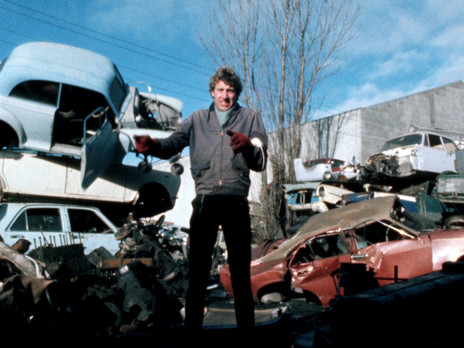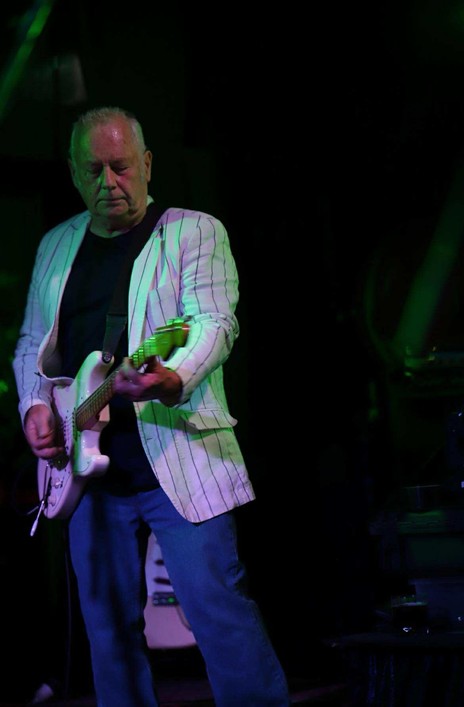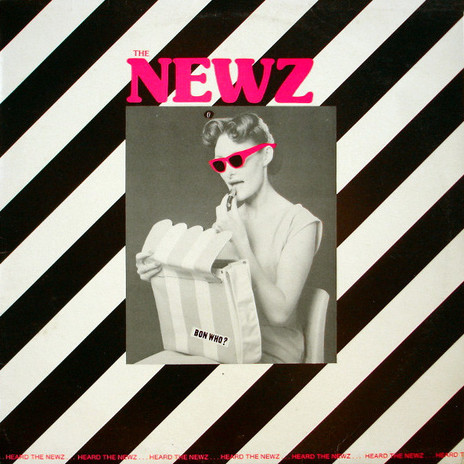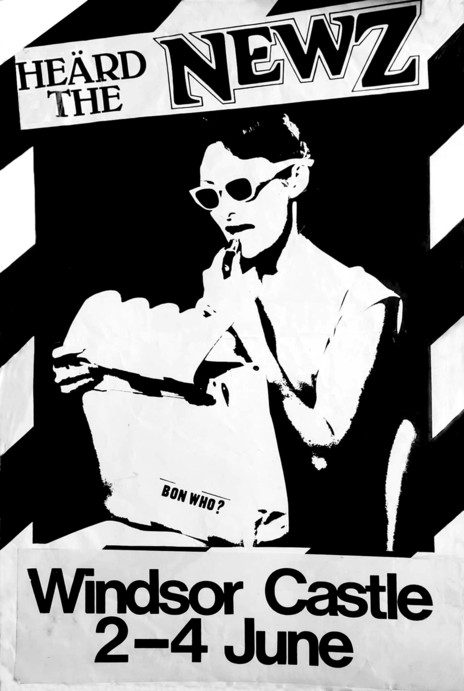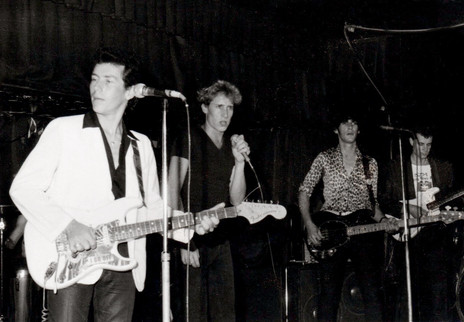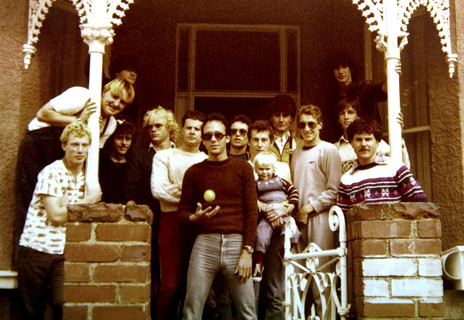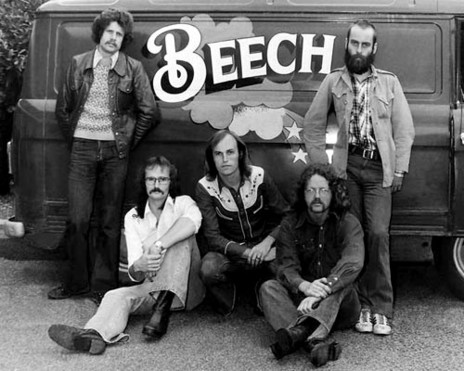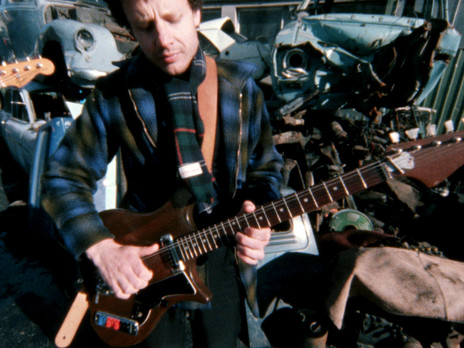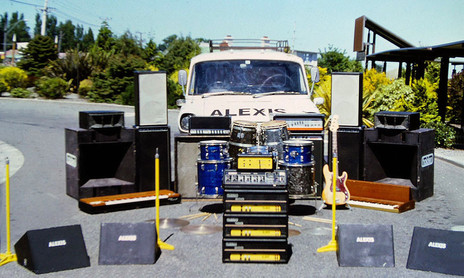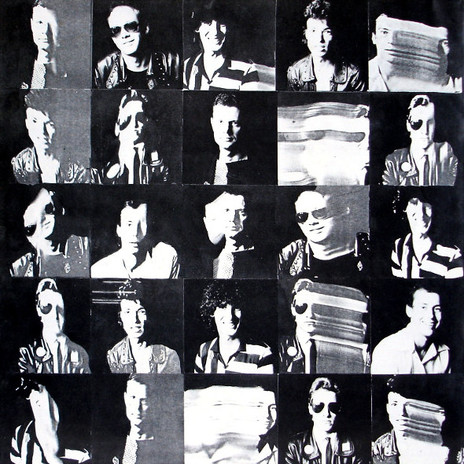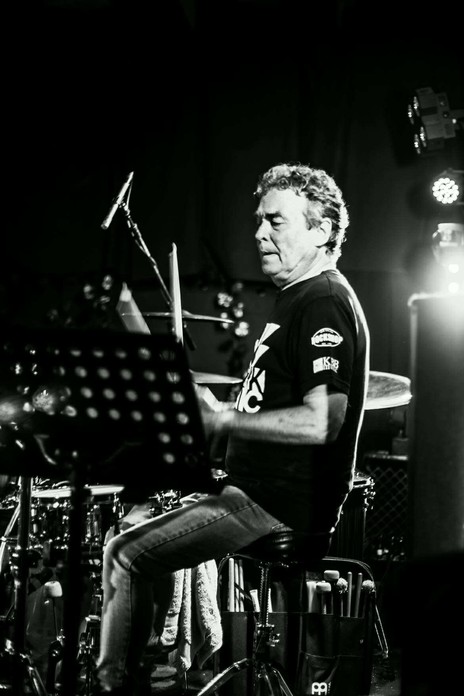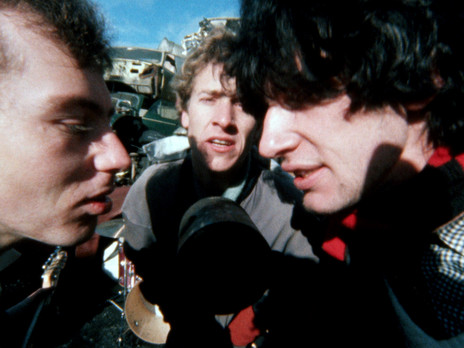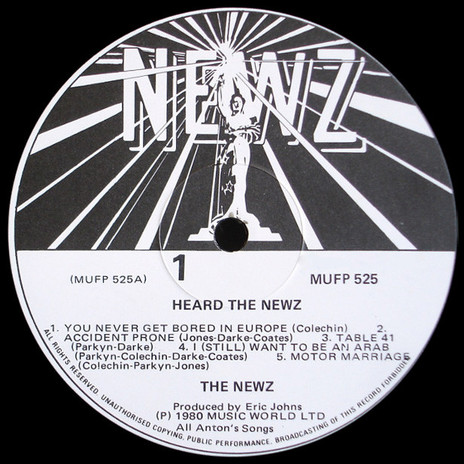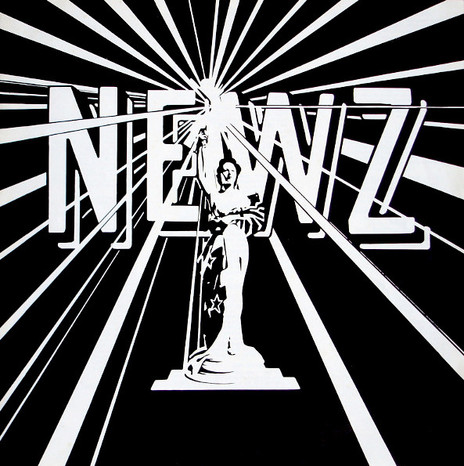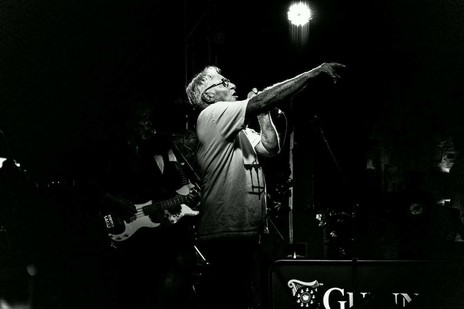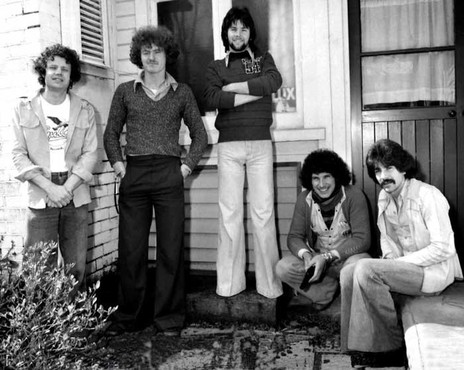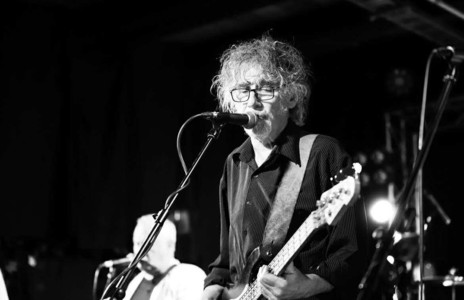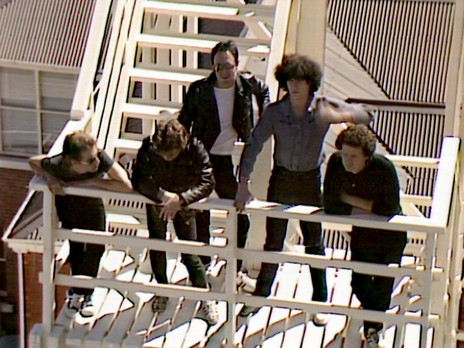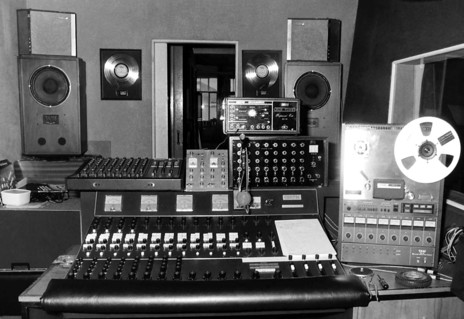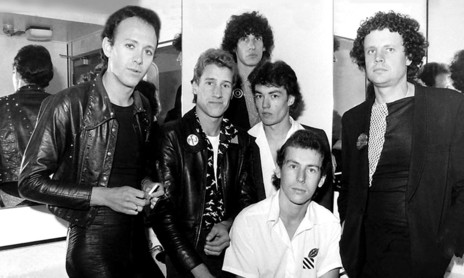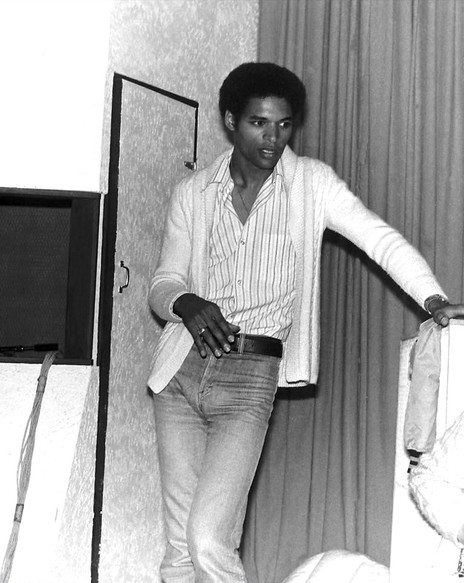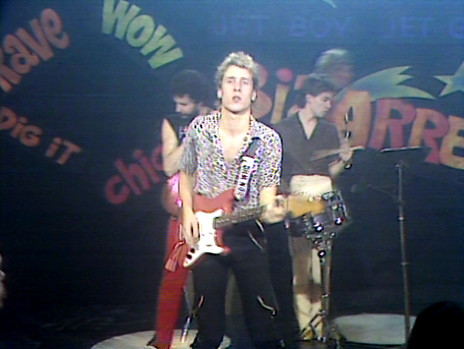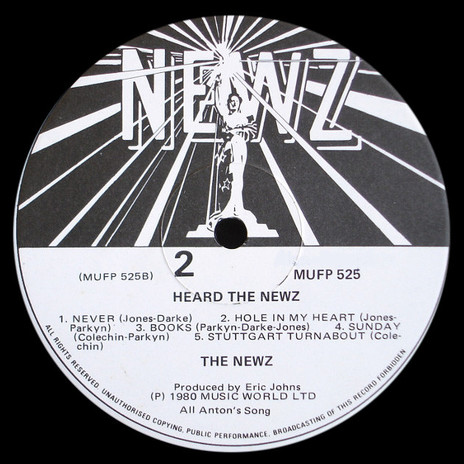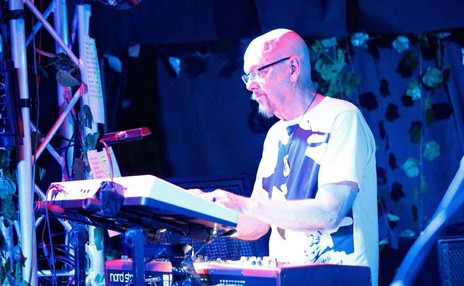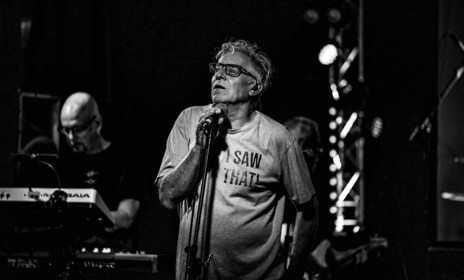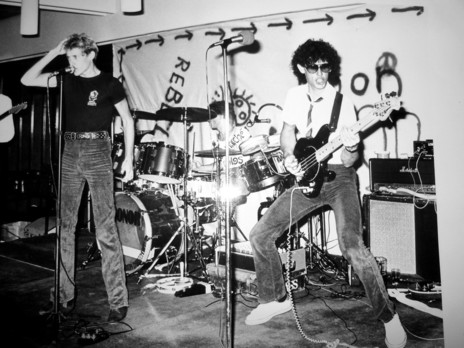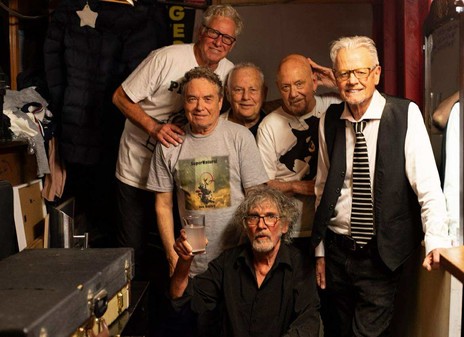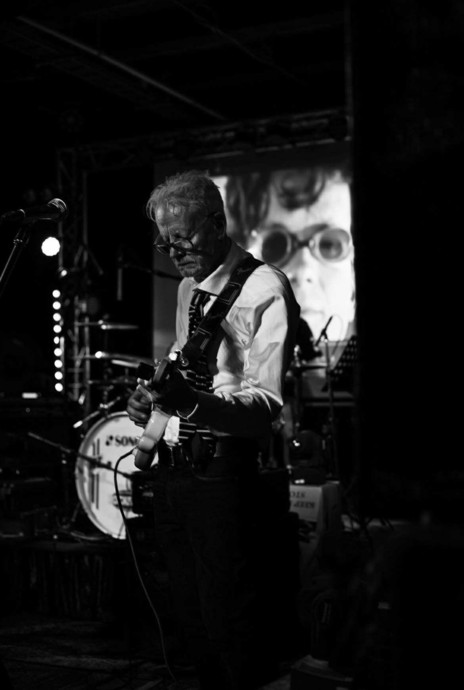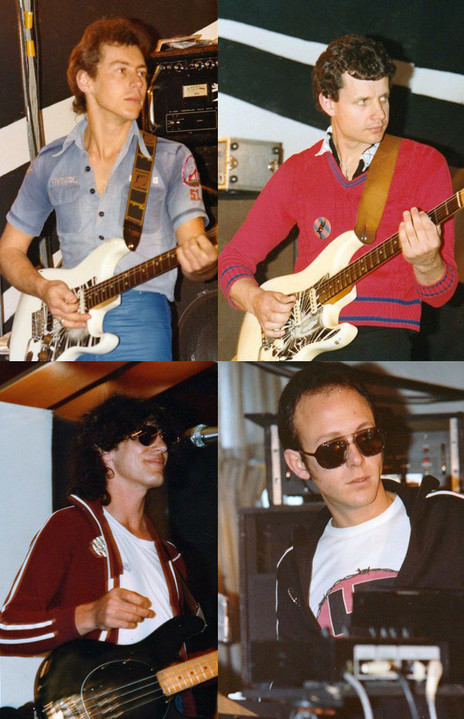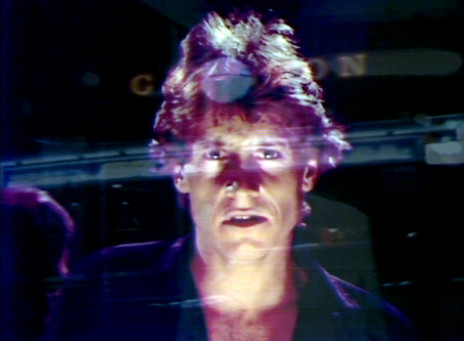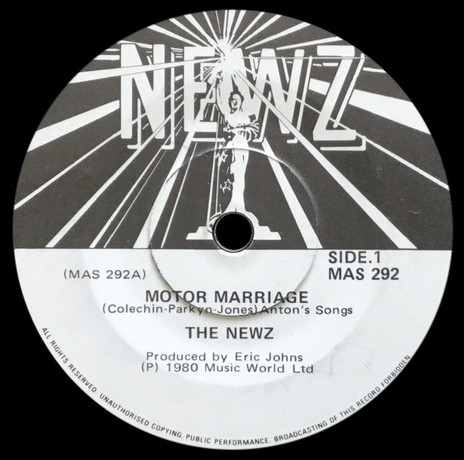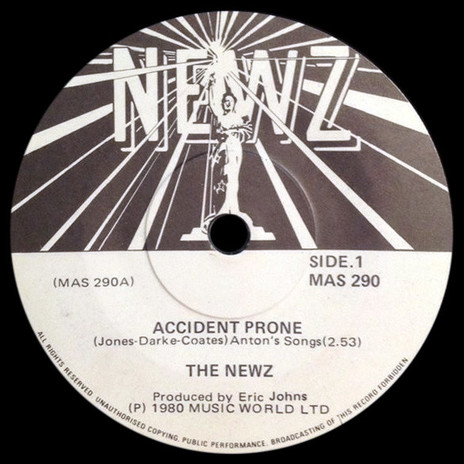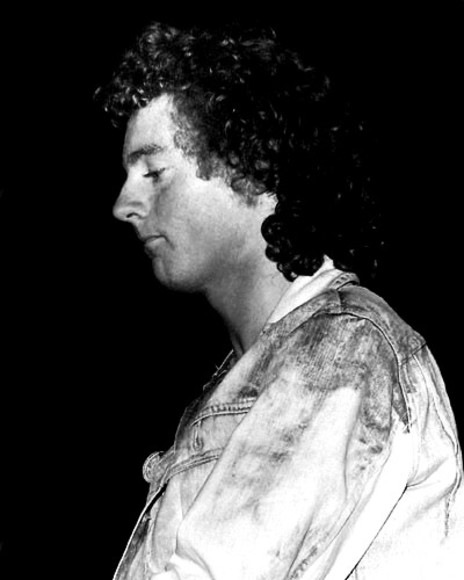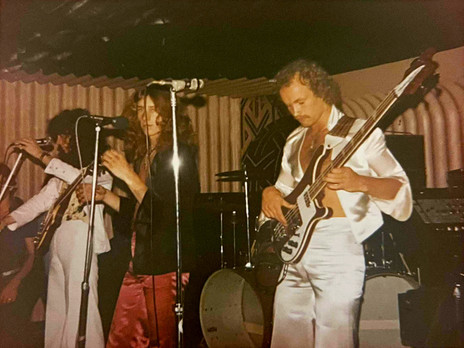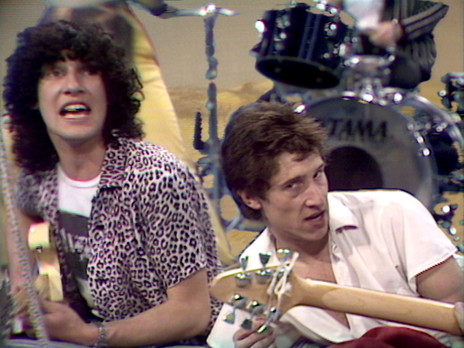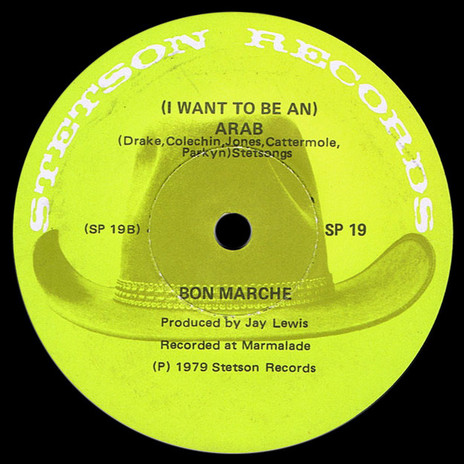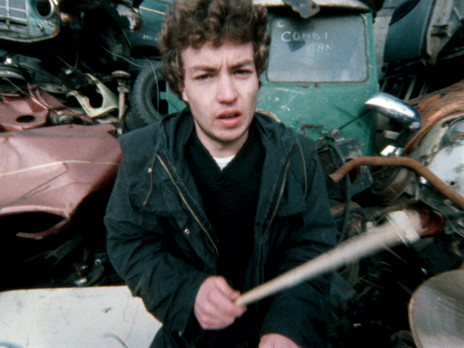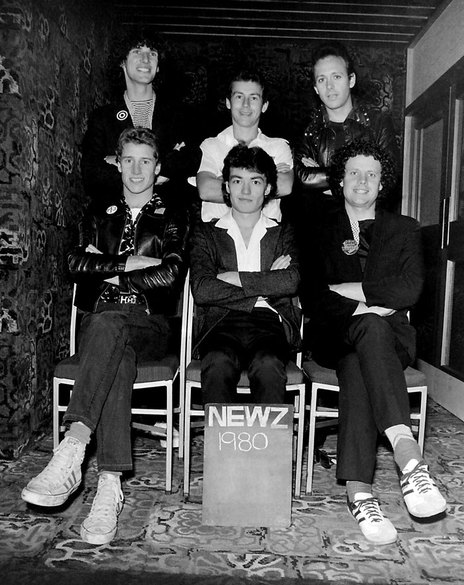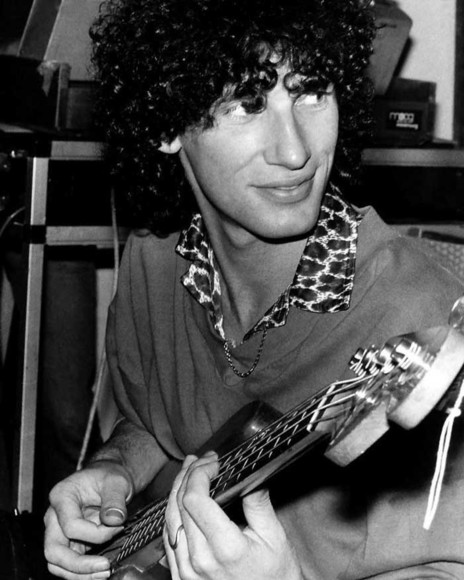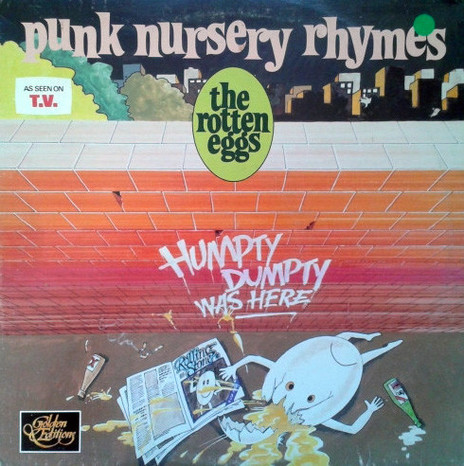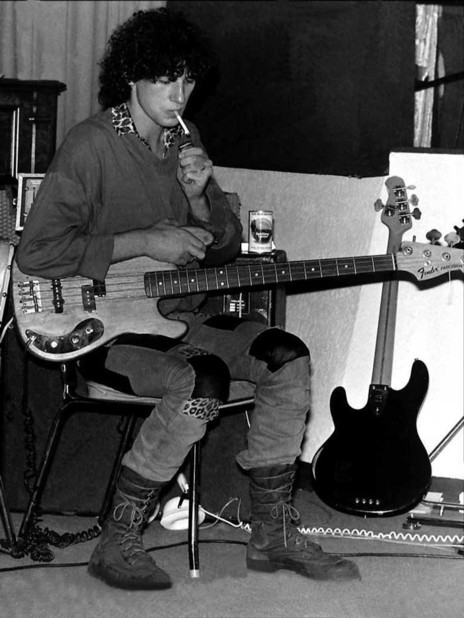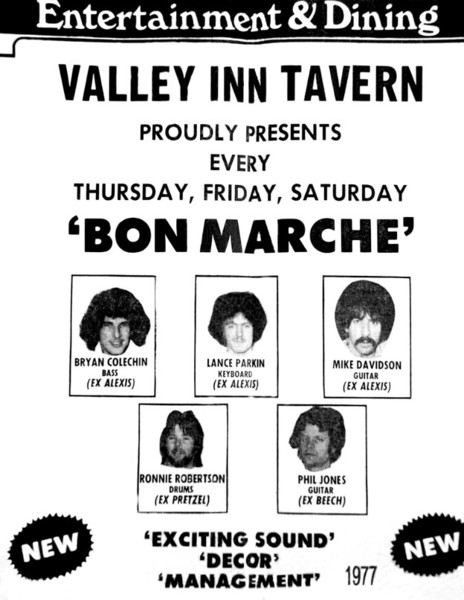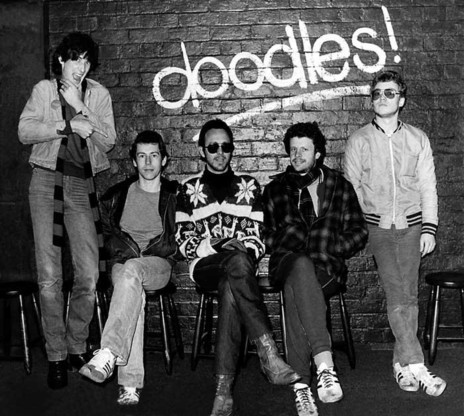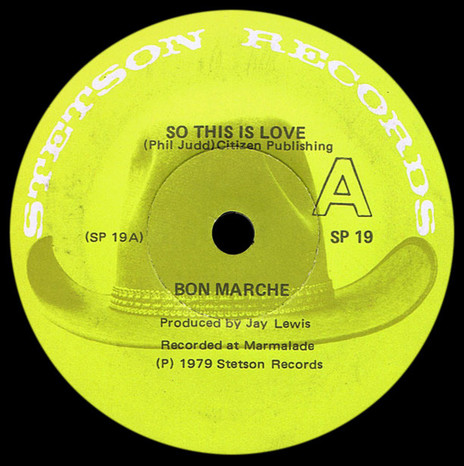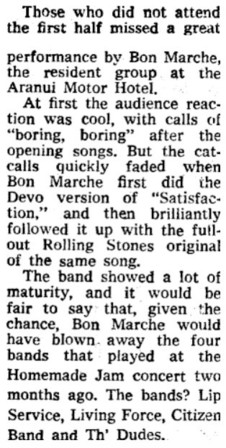Bon Marche formed in 1977 when Bryan Colechin, Lance Parkyn, and Phil Jones took a residency at the Valley Inn in Heathcote, near the Lyttelton tunnel. The name came from the Steely Dan song ‘Haitian Divorce’; “bon marché” means “good deal”. “The music we were playing was a mixture of funk, jazz-fusion, and songs by Renee Geyer,” says Jones. “We did a concert with her in the early days of their previous band The Sunshine Dinner Band.” The original drummer Chris Whitehead left, replaced by Ronnie Robertson.
Simon Darke was invited to join the band on vocals. “That was the turning point for us,” says Jones. “Then along came Allan Cattermole on drums at the invitation of Simon … and just before the Aranui residency Mike Davison quit the band.” Trevor Spitz secured them the Aranui slot.
In the late 70s most Christchurch bands relied on covers of current hits to earn a living
In a city of roughly 300,000 – with 30 to 40 pubs hosting live music – most bands relied on covers of current hits to earn a living. Bon Marche/ The Newz stood out, playing six nights a week while writing original songs that blended new wave, post-punk, and punk, drawing from influences including the Stranglers, XTC, Devo, Sex Pistols, Elvis Costello, Talking Heads, Blondie, The Cars, and Iggy Pop, as well as genres the members had picked up on their path to The Newz such as funk, jazz-fusion, reggae elements.
They kept their distance from the post-punk scene at venues such as The Gladstone, Star & Garter, and Hillsborough. Some in the alternative crowd saw them as overly polished “musos” with their roadies, stagehands, and professional setup. “We were hated and derided by the punks, and I believe this was because we could all play our instruments well and got the gigs, but that’s just my personal theory,” said Cattermole in 2025. “We were definitely written off as ‘just a covers band’ in Stranded in Paradise, a book about the New Zealand music scene. Bugs the shit out of me so I am very grateful to get the record set straight.”
The band, however, stayed focused on their music and their loyal Aranui Tavern following. Over time, their work, like the single ‘Accident Prone’ and the 1980 album Heard the Newz, has been recognised as standing up to the test of time.
The early 1980s in New Zealand carried tension. Prime Minister Robert Muldoon’s government imposed high taxes on imported goods, framing music as more of an indulgence than essential, which left musicians adapting with resourcefulness. The 1981 Springbok Tour sparked riots and police crackdowns, fuelling a sense of defiance. For The Newz, this climate shaped their attempt to import US equipment, which ended in a Customs bust that made headlines and halted their Australian ambitions. Still, they look back affectionately and have fond feelings for their time in The Newz, despite the fizzle of the ending with its missteps.
The members and their paths
The band members came from deep roots in New Zealand’s music scene, many starting as teenagers, leaving school or home to chase gigs. It meant long drives in vans, cheap band houses, and nightly performances, but it forged lasting bonds.
Phil Jones (guitar, 1977-1983): Began playing guitar at 15 with The Zounds in 1965. Progressed to play in Rum Jungle, Blues Army Salvation, Cold Rock, Oats and Hay Band, and Lord. He joined country-rock band Beech in 1973 with Andrew Forrer, Ron Mahoney, Andrew Kay, Brent Parlane, and Don Bean; the band focused on creating original material and played extensively.
Beech broke up in 1976, and Phil took a job at a carpet factory. Bryan Colechin contacted him after seeing Beech at the 1975 Christchurch Town Hall gig with Alexis and Ticket. “I was blown away with Alexis,” says Jones. “The only person I knew in that band was the guitarist Mike Davison. A few months later dear Bry somehow got my number, introduced himself, and suggested that we form a band together as he knew a drummer called Colin Chappell. I previously had been in a country-rock band [Beech] and was blown away how funky Bry’s playing was and I wanted to explore that avenue of music which morphed into jazz-fusion, neo classical and reggae. We had our first rehearsal at Rutherford’s Den in the Christchurch Arts Centre where, instead of splitting atoms, we split each other’s eardrums.”
They messed around with lineups including The Sunshine Dinner Band, which included Brent Stanton (now a flautist in New York) and Liam Ryan (later with The Narcs and Midge Marsden).
This eventually led to Bon Marche and on to The Newz. Jones wrote or co-wrote songs and played on all their records. After The Newz, he joined Sharks, The Coolies, Incognito, Helen and the Hound Dogs, The Latter Day Sinners (Al Park, Wayne Jamieson, drummer Bruce Hambling [Th’ Dudes] and Murray Jackson), Lowdown, and now The Rewind Blues Band. “I’ve had the privilege of a diverse and extensive music career spanning over five decades ... I am really looking forward to the Newz reunion.”
Bryan Colechin (bass, 1977-1983): Born in Whanganui and moving to Christchurch in 1964. “My first professional band was Alexis, formed in 1975 with school friend Lance Parkyn. Alexis played funk à la The Meters, Isley Brothers, and AWB. Alexis broke up after a long residency at the Aranui and then Shantytown nightclub in Auckland, then Colechin and Jones formed Bon Marche with Parkyn.
“Once we became Bon Marche we started writing songs in earnest,” says Jones. Colechin wrote basslines and collaborated on lyrics. “Bry and I were working on originals way back in the Sunshine Dinner Band days.”
“Once we became Bon Marche we started writing songs in earnest,” says Jones
After The Newz, Colechin moved to Melbourne, joining Marching Girls, recording an EP, and touring New Zealand. “Post MGs I played with several Melbourne bands. The Wreckery, Crashland (who made it to Berlin), Barry Plankton, and others before joining up with Hugo Race and his band the True Spirit in Berlin resulting in a collaboration which lasted over 30 years and 16 CDs. I was also a member of Charlie Marshall and the Body Electric recording several CDs with him. And Hellhounds (2012-2014).”
Lance Parkyn (guitar/keyboards, 1977-1980, Bon Marche): Parkyn was Colechin and Cattermole’s school friend; he played in Ferret, a high school blues band with Cattermole, and co-founded Alexis in 1975. With Cattermole he gave Bon Marche its name. “It’s from ‘Haitian Divorce’ by Steely Dan,” recalls Cattermole. “It means ‘good deal’.” Parkyn recruited Simon Darke. “Simon joined before I did,” continues Cattermole, “it was Lance’s idea to get Si because they had played in Wellington in different bands.” Parkyn wrote songs and played guitar and keyboards. “Lance was a very good songwriter and we all chipped in with ideas. He played keyboards, and guitar and also sang. He left in 1980 just after he got married for family lifestyle reasons.” Later, he played with Freddie Lounder and the Soles, formed to raise money after the Customs bust, and joined The Domino Theory in Melbourne with Colechin and Cattermole.
Simon Darke (vocals, 1978-1983): Wellington-bred Simon Darke started in the city’s Red Rose with Cattermole. Red Rose played disco covers in nightclubs such Uncle Albert’s Attic and Dr Johns, and appeared on TV soap Close to Home getting actor rates. Parkyn recruited Darke for Bon Marche in 1978, just before the band’s residency at the Valley Inn Tavern, Heathcote. “Simon was great with lyrics and Bry was a great collaborator,” says Cattermole. Darke fronted the band on TV and records. “We reached a new level having someone in the band with charisma and who could really sing.” After The Newz, says Cattermole, “Simon didn’t do much music despite being one of Christchurch’s outstanding vocal talents.”
Allan Cattermole (drums, 1978-1983): Born in Christchurch in 1958, Cattermole started drumming young, influenced by his father in the Addington Workshops Brass Band. “I played the drums from an early age, as my dad played and I wanted to be just like him.” At 15, he left school for Sneaky Feet with Colin Bayley. “I started playing in pubs at around age 15 … I wanted to be a drummer and didn’t feel I was learning anything relevant at school.” At 18, he moved to Auckland and joined Skylord, touring the North Island. “I did this for maybe 12 months before I got a call from Colin Bayley who was then residing in Wellington. He was forming a band called Red Rose.” After a stint with Red Rose, and a brief return to Skylord before it folded, Cattermole returned home to Christchurch.
Simon Darke insisted Allan Cattermole join Bon Marche as drummer in 1978
Simon Darke insisted Cattermole join Bon Marche in 1978. “Bon Marche was already playing,” says Cattermole. “Their drummer was a lovely chap called Ronnie but Simon thought I would be better and told the other members they needed me and he [Simon] would leave if they didn’t add me to the lineup.” Cattermole played drums on all recordings. “Al took us to a new dimension with his brilliant drumming,” recalls Jones. Cattermole suggested Brad Coates and Tony Rabbett for The Newz. “We could not find any one person to replace Lance so I suggested Brad as a keyboard player, as Skylord had disbanded, and I think he suggested Tony as the rhythm guitarist and additional singer.”
After The Newz, Cattermole joined The Domino Theory, Party Pros (later Sharp Five), and The Coalrangers. He also toured with Dion Pride, and was still playing in two Christchurch bands in 2025. “A cover band called Boogie House, which is broadly blues based, and an original band called ceebayley.”
Brad Coates (keyboards, 1980-1983, The Newz): Born in Mt Roskill, Auckland, Coates started keyboards at 12. In 1968, at the age of 15, he joined one of the many iterations of The Motivation with Roger Skinner, recording for PYE and backing TV shows. “I had learnt the solos from Deep Purple’s ‘Hush’ and ‘Child in Time’ note for note. I believe it was this – and the fact that I lied about my age, claiming to be 18 – that got me the gig.”
In 1971, Tramline, a band featuring Coates, won the Coca-Cola Battle of the Bands. “We took an enormous risk ... re-arranging Uriah Heep’s 16-plus minutes long opus called ‘Salisbury’ and cutting it down to around eight minutes.” Tramline backed Craig Scott and Bunny Walters. They got a Western Springs support slot for Creedence Clearwater Revival, toured Australia and eventually disbanded. Back in New Zealand, Coates formed glam/prog-rock band Pawn, which became Skylord with Allan Cattermole.
“Skylord was enormously successful, pulling huge crowds up and down the country. I can recall one such gig at the Awapuni Hotel in Palmerston North where we could have literally stepped off the stage and walked to the back of the room on top of the heads of the crowd, the crowds were that tightly packed. A good 2500-3000 people.”
Cattermole recruited Coates for The Newz in 1980. “Having seen the band playing on tour in Auckland and absolutely loving what they did, the answer was an instant Yes,” says Coates, who added keyboards and helped write ‘Accident Prone’. “Going in completely cold all round, we chucked a few ideas together, Phil got some chords together, Bryan coming up with a simple bass line for the verse, me embellishing it with a hook line. It led very quickly and quite naturally to a chorus with Simon making up lyrics effectively based upon Bryan’s innate metatarsal clumsiness [big feet] on stage. Thus was born ‘Accident Prone’, which ended up being a very successful single, forever identified with the band.”
Tony Rabbett (guitar/vocals/technical manager, 1980-1983, The Newz): Rabbett started The Inbetweens in 1967 aged 13 in Dunedin with his brother Paul and Roland Farmer; they were managed by their mother Phyllis. The Inbetweens won the 1970 Battle of the Bands and reached the Loxene Golden Disc finals with ‘Boom-Sha-La-La-Lo’. The band moved from pop to prog-rock, glam, and funk, touring New Zealand, Sydney, and Los Angeles. “I’ve been in the music industry my entire life,” says Rabbett. Allan Cattermole suggested Rabbett for The Newz in 1980: “I’m pretty sure Inbetweens had also disbanded by this time,” says Cattermole.
Rabbett played guitar, sang, and served as technical manager, organising an equipment import plan. “The main thrust behind it all was to be able to provide a standard of performance that punters were getting used to when seeing overseas acts.”
After The Newz, Tony taught at the Mainz School of Audio Engineering, worked in music equipment retail, and played in Party Pros and Sharp Five.
The Newz emerges
Parkyn left in 1980 for family reasons, having just recently gotten married. The band added Brad Coates and Tony Rabbett. “We decided on a name change as the band was now quite different,” says Cattermole, “but I have no idea who came up with the The Newz name.” They continued the Aranui residency and focused on originals. Colechin, Jones, and Darke wrote songs. “We all chipped in with ideas,” says Jones. “Simon was great with lyrics and Bry was a great collaborator and Al came up with excellent drum feels.”
The Newz toured New Zealand but struggled outside Christchurch. “We made a couple of forays up to the North Island playing Auckland’s Gluepot, and Island of Real, but found it difficult to make any headway,” says Cattermole. “Much prejudice against anything not from Auckland.”
The Aranui residency ran from 1978 to 1981. “We had a strong following at the Aranui and had great energy and heaps of attitude,” says Cattermole. “Loved or hated, we were not ignored.”
“We would often use the Saturday afternoon sessions at the Aranui to give young bands the opportunity to play before a live audience. Bands like Zero Bars, Pop Mechanix and the Dance Exponents spring to mind. I think this shows both how confident we were with ourselves and also how much we wanted to support other up and coming bands.”
The band also had high-profile gigs, such as supporting Peter Frampton at Lancaster Park in 1978, and Talking Heads at the Christchurch Town Hall in 1979.
The Records
Bon Marche released a 7-inch single in 1979 on Stetson Records: “So This Is Love” (a Phil Judd cover), backed with an original by all the band members, ‘(I Want To Be An) Arab’. The tracks were recorded at Marmalade in Wellington, and produced by American, Jay Lewis. “All paid for by Mr Macpherson,” says Cattermole, referring to Stewart Macpherson of the Stetson label, who also booked and managed the band. Lewis had recently produced Sherbet, Citizen Band and Sharon O’Neill.
The band appeared on Ready to Roll, starting with covers such as ‘Jet Boy, Jet Girl’ but moving to originals, including ‘(I Want To Be An) Arab’, and two songs that were not released by this line up, ‘Books’, and ‘Motor Marriage’. Both songs would later be recorded and released by The Newz.
In early 1980, Bon Marche changed its name to The Newz. This was, said Jim Wilson in the February Rip It Up, “to avoid confusion with a chain of Europe fashion stores.”
The Newz’s first single was in 1980, ‘Accident Prone’ b/w “Never’. It was accompanied by a video made in a Christchurch car wrecking yard and various vintage street scenes.
Their album Heard the Newz was released soon after on Music World, a Christchurch label known for budget sound-alike records. Music World’s albums were often all cover versions and novelties, although the label did release many local country music albums and licensed overseas compilations. It was The Newz’s only offer, with good distribution and manufacturing. The options were slim-to-none in Christchurch at the time.
The Newz recorded their LP at Tandem studio, on Colombo Street
They recorded at Tandem studio, on Colombo Street above Begg’s music store. “It was really hard!” says Cattermole. “Recording is so different from playing live and we had very little experience of it at that time. The studio was mainly used for recording jingles for radio and the equipment was, well, fairly primitive to be honest. The engineer, John Phair, and Eric Johns did a great job under the circumstances and I don’t think they could have done any better. I seem to remember the 8-track tape machine was only working on seven tracks.”
The producer was Eric Johns, a US guitarist married to Colechin’s sister Emma. Johns had quite a pedigree: he was a former guitarist of US group Heatwave, and played on their massive disco-funk 1977 hit ‘Boogie Nights’. “When Bry’s sister Emma came back to Christchurch with Eric Johns, Eric was very supportive and I think he may have suggested a new musical direction,” says Jones.
Released on Music World in 1980, the Heard the Newz album has 10 tracks; the second single was “Motor Marriage” b/w “Sunday”, both from the album.
Using the pseudonym The Rotten Eggs, the Newz recorded the album Punk Rock Nursery Rhymes for Music World. The label wanted to cash in on the punk craze so conscripted the band to write and record an album of nursery rhymes delivered in pop punk style. It sold quite well and has had some international cult success. Until recently the real identity of the band was unknown; also uncredited was the producer, Eric Johns.
The Customs story
The band wanted better equipment to match international acts. “The band was so much better than the equipment could express,” says Rabbett. At the time, New Zealand’s import laws protected local manufacturers such as Holden and Jansen, with high taxes and no import licences awarded for music gear. “Back in those days bands could only buy New Zealand-made equipment,” says Rabbett. “The government put ridiculous import duties on anything not made in New Zealand.”
The band came up with a variety of ways to bypass the restrictions, motivated by their obsession for big professional sounds, and the climate of distrust of government and unrest at the time. This led them to push the boundaries and skirt the rules, planning trips overseas to get the gear they wanted with creative ways to sidestep the regulations.
Rabbett: “I had several thousand dollars in $1 and $2 notes to try to hide for the trip to LA. The only way that I could hide the money was to stuff the bundles of money into a pair of rugby socks that I was wearing.” He bought used gear from Soundco in Los Angeles. “Came back into New Zealand with everything and no problems from Customs.”
They used the equipment at the Aranui. But when shipping to Australia, New Zealand Customs intervened. “While I was at the freight office at Christchurch airport, I got dragged into an office,” says Rabbett. “Two guys there started questioning me about the origin of all the equipment. They then said, ‘We have reason to believe that this equipment has been illegally imported into New Zealand and that you are also involved in drug importation.’”
Customs linked it to their LA contact’s drug bust. “I guess they thought that sound equipment and drugs were coming into Christchurch via the band. They confiscated all the gear and told us that it would go on to a police auction.”
The band formed Freddie Lounder and the Soles to play gigs to raise funds and buy most of the equipment back at the police auction.
“It all reads like some kind of a fictional novel now,” says Coates. “It just goes to show how something relatively innocent can blow out to becoming a major issue ... Tony took the rap solely on his own.” The equipment was confiscated, and Rabbett was fined but not prosecuted. The news was reported on the front page of the NZ Herald, and on television, which filmed Customs officers showing all the equipment that they confiscated. “Almost like they do for a major drug bust … [it] totally fucked up the big move to Aussie.”
Australia
Cattermole: “I remember we played at an outdoor concert at Jelly Park in Christchurch, and a certain Michael Gudinski was there. He said if we came to Melbourne he would get us gigs through his agency, Premier Artists, and offer us a recording contract with Mushroom Records. So in 1981 we decided to move across the ditch.”
In Australia, The Newz played five or six nights a week. At the Chevron, they shared bills with The Church, Sunnyboys, Divinyls, and Broderick Smith. “Melbourne was a challenge for us really as we were more influenced by English music and bands like Talking Heads but Oz was all AC/DC, Midnight Oils, and The Angels, so we were up against it in a lot of ways.”
“Australia was all AC/DC, Midnight Oils, and The Angels, so we were up against it”
Pay was modest. “Supports might be worth $200 or $300 but we had to either pay to hire the main act’s PA, sometimes $150 or more, or supply a couple of ‘Loaders’. Over time we had several ‘band houses’ where we all lived and shared cooking duties, five band members, two crew and a wife with two small children – all in a three-bedroom suburban house nearly 30km from the city centre. The band paid our accommodation and food costs and equipment maintenance but I don’t think we took much in the way of wages.”
While in Australia, The Newz supported visiting acts such as Tina Turner, Canned Heat, and Joan Jett, as well as Midnight Oil, Cold Chisel, Hunters & Collectors, John Farnham, Australian Crawl, and the Models.
“We got offers, but we couldn’t all come to an agreement in the end.” says Cattermole. They turned down deals from Mushroom, RCA, Powderworks, and Festival.
Coates recalls: “The reality was we had decided on RCA who came in initially with an offer of 11.5% which via our lawyer we pushed up to 14.5%, aiming for an eventual 15%. The A&R guy moved on and new management came in. ‘Are we going to sign this 14.5% now, boys?’ Us: ‘No … 15% is what we want.’”
The A&R man responded, “Well boys, we all have important lessons in life to learn. I’d like you to all get up, turn around and walk out that door and not return.”
Coates: “I think he may have also mentioned something about not playing with the big boys. Mass deflation.” Coates ruefully comments that a mere 0.5% brought about the band's demise.
The Newz split in 1983. “To be honest,” says Cattermole, “I can’t recall exactly when or why we decided to call it a day, but Tony and Simon moved back to Christchurch and after a few months so did I, and that was the end really.”
The Reunions
The Newz reunited to play a gig at the Ferrymead Tavern, Christchurch, on 25 October 2015. The band on this occasion was Simon Darke, Brad Coates, Tony Rabbett, Alan Cattermole, Bryan Colechin, and Phil Jones.
Ten years later, in October 2025, The Newz reunited again, to play gigs over two days, performing their album and other songs from their catalogue. As they geared up for the reunion, they looked back on a legacy that was a testament to friendship, resilience, and a sound that still resonates. Both shows were sold out.
Bon Marche and The Newz were determined, hardworking, obsessive and unsung members of a local music scene, blending professional grit with creative ambition in an often-judgemental 1980s scene. Their original songs, from early Bon Marche tracks to The Newz album Heard the Newz, showcased a band ahead of its time, undeterred by punk snobbery. “We were confident and wanted to support other bands,” Cattermole says, reflecting their generosity. The Customs saga, while a setback, highlighted their ingenuity, and their Melbourne venture underscored their international dreams.
The band members view their time as a success on their own terms. Anticipating the 2025 reunion, Cattermole reflected: “I think we just wanted to celebrate that one last time and I am very much looking forward to it, not so much musically, but as a celebration of our friendship that has lasted nearly 50 years.”
--
